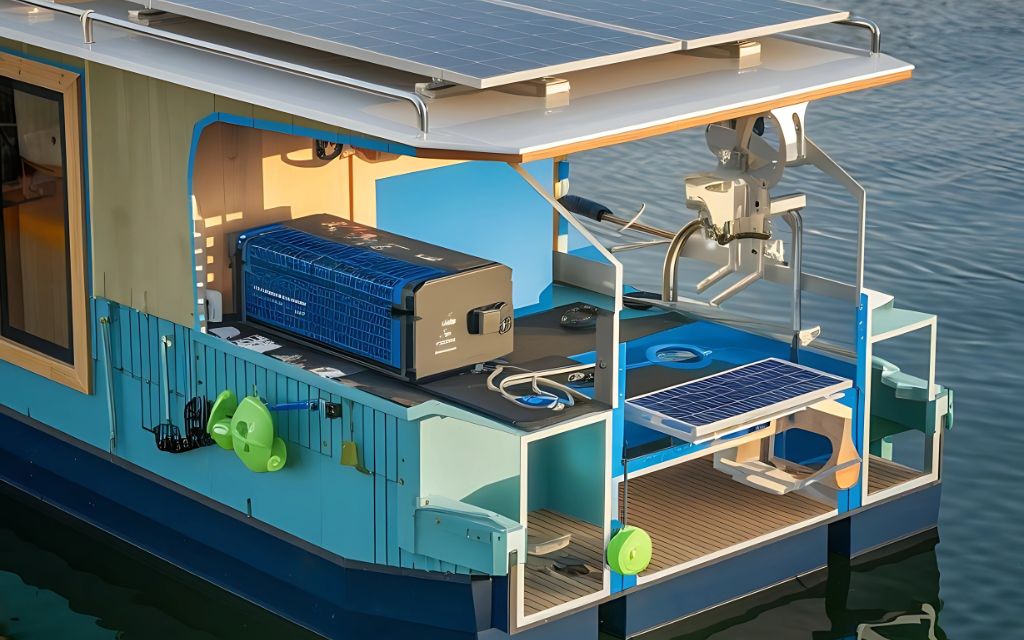Table of Contents
Understanding how to minimize your environmental impact while houseboating
Houseboating offers an incredible way to explore waterways and connect with nature, but it also comes with significant environmental responsibilities.
Eco-friendly boating tips are crucial for preserving the delicate marine ecosystems we love to explore.
Sustainable boating isn’t just a trend—it’s a necessary approach to protecting our planet’s precious water resources.
The environmental challenges associated with houseboating are numerous:
- Fuel emissions contaminating water and air
- Waste management issues
- Potential damage to marine habitats
- Energy consumption from onboard systems
| Environmental Challenge | Potential Impact | Sustainable Solution |
|---|---|---|
| Fuel Emissions | Water pollution | Renewable energy sources |
| Waste Disposal | Ecosystem damage | Comprehensive recycling system |
| Energy Consumption | Carbon footprint | Solar and wind power |
| Marine Habitat Disruption | Ecological stress | Responsible navigation practices |
Benefits of Eco-Conscious Boating
Embracing green boating practices offers multiple advantages:
- Reduced environmental footprint
- Cost savings through efficient resource management
- Enhanced connection with natural environments
- Contribution to marine conservation efforts
Green Boat Design and Modifications

Choosing an Eco-Friendly Houseboat
When minimizing environmental impact, selecting the right houseboat is paramount. Look for vessels designed with sustainable boating materials and energy-efficient features.
Key considerations for eco-conscious boating include:
- Lightweight construction materials
- Integrated renewable energy systems
- Efficient hull design
- Low-emission propulsion technologies
| Feature | Eco-Friendly Benefit | Implementation |
|---|---|---|
| Lightweight Composites | Reduced fuel consumption | Carbon fiber/advanced polymers |
| Solar Panel Integration | Renewable energy | Roof-mounted photovoltaic systems |
| Efficient Hull Design | Lower water resistance | Streamlined hull shapes |
| Electric Propulsion | Zero direct emissions | Battery-powered or hybrid systems |
Retrofitting Your Houseboat for Sustainability
Renewable energy for boats can transform your existing vessel into an eco-friendly haven. Consider these green boating innovations:
- Solar panel installations
- Wind turbine energy generation
- Energy-efficient LED lighting
- Smart power management systems
Efficient Energy Management
Utilizing Renewable Energy Sources
Solar power for boats has revolutionized marine energy consumption. Modern solar technologies offer:
- Compact, high-efficiency panels
- Battery storage systems
- Integration with existing electrical networks
Optimizing Energy Consumption
Energy-efficient boating requires strategic approaches:
- Use LED lighting exclusively
- Install smart power management systems
- Choose energy-star rated appliances
- Implement passive cooling techniques

Water Conservation Techniques
Reducing Water Usage Onboard
Water conservation on boats is critical for sustainable marine living:
- Install low-flow water fixtures
- Collect and filter rainwater
- Use water-efficient appliances
- Implement greywater recycling systems
Protecting Water Quality
Eco-friendly marine products play a crucial role in maintaining water quality:
- Biodegradable cleaning solutions
- Phosphate-free detergents
- Proper sewage management systems
- Regular water quality testing
Waste Reduction Strategies
Effective Waste Management
Waste reduction on boats requires comprehensive strategies:
- Comprehensive recycling system
- Composting organic waste
- Minimizing single-use plastics
- Proper disposal of hazardous materials
Sustainable Product Choices
Biodegradable boating supplies help minimize environmental impact:
- Eco-friendly cleaning products
- Reusable kitchen and dining items
- Sustainable packaging
- Locally sourced provisions
Sustainable Living Practices
Growing Your Own Food
Onboard gardening offers multiple benefits:
- Fresh, organic produce
- Reduced provisioning needs
- Enhanced sustainability
- Improved self-sufficiency
Adopting Eco-Friendly Habits
Environmentally friendly boating extends beyond technology:
- Mindful consumption
- Reducing overall waste
- Supporting local, sustainable businesses
- Educating fellow boaters
Responsible Boating Behavior
Navigating Responsibly
Low-impact boating requires careful navigation:
- Avoid sensitive marine habitats
- Follow designated navigation routes
- Minimize anchor damage
- Respect wildlife zones
Reducing Fuel Consumption
Green boating strategies for fuel efficiency:
- Optimize route planning
- Maintain consistent, moderate speeds
- Regular engine maintenance
- Consider alternative propulsion methods
Community and Environmental Advocacy
Participating in Local Conservation Efforts
Sustainable marine tourism involves active community engagement:
- Join local environmental groups
- Participate in waterway clean-up events
- Support marine conservation initiatives
- Share knowledge with fellow boaters
Educating Fellow Boaters
Spreading awareness is crucial for widespread adoption of green boating solutions:
- Host sustainability workshops
- Share best practices online
- Mentor new boaters
- Lead by example
Conclusion: The Future of Eco-Friendly Houseboating
Vision for a Sustainable Boating Community
Sustainable boating innovations continue to emerge, promising:
- More efficient renewable energy systems
- Advanced waste management technologies
- Smarter, more environmentally friendly boat designs
- Increased ecological awareness
FAQs
Frequently Asked Questions About Sustainable Boating
How Do You Minimize Impact on the Environment?
Minimizing your environmental impact while boating starts with a holistic approach to conscious living on the water.
It’s about making intentional choices that reduce your ecological footprint, from the energy you use to the products you bring onboard.
Think of your houseboat as a small ecosystem where every decision matters – from choosing eco-friendly cleaning products to managing your waste carefully.
The key is a combination of mindful practices and smart technology. This means investing in renewable energy sources like solar panels, using biodegradable supplies, implementing a robust recycling system, and being extra cautious about how you interact with the surrounding marine environment.
It’s not about perfection, but about consistent, thoughtful actions that add up to make a real difference.
How to Make a Boat Sustainable?
Transforming your boat into a sustainable haven requires a multi-faceted approach that touches on design, energy, waste management, and daily practices.
Start by evaluating your current boat’s systems and looking for opportunities to upgrade to more energy-efficient alternatives.
This might mean replacing old appliances with energy-star rated versions, installing solar panels, or switching to LED lighting that consumes less power.
Beyond technological upgrades, sustainability is about creating a holistic ecosystem onboard. Consider your water usage – install low-flow fixtures, collect rainwater, and implement greywater recycling systems.
Choose materials and products that are environmentally friendly, from your cleaning supplies to your kitchenware.
It’s a journey of continuous improvement, where each small change contributes to a larger positive impact on our precious marine environments.
How Can We Reduce Pollution from Ships?
Reducing pollution from ships is a critical challenge that requires action from individual boat owners to large maritime industries.
For personal watercraft, this means being hyper-aware of your fuel consumption, engine maintenance, and waste management.
Regular engine tune-ups can significantly reduce emissions, while choosing cleaner fuel alternatives or hybrid propulsion systems can dramatically cut down on harmful exhaust.
Waste management is another crucial aspect of reducing marine pollution. This involves careful disposal of all waste, including using proper sewage treatment systems, avoiding any plastic or chemical runoff, and being mindful of your overall consumption.
Consider using biodegradable products, implementing a comprehensive recycling system onboard, and always following local and international maritime environmental regulations.
How Can We Stop Boat Pollution?
Stopping boat pollution is a collaborative effort that starts with individual responsibility and extends to broader policy and technological innovations.
As a boat owner, you can make significant strides by adopting clean technologies, maintaining your vessel properly, and being extremely cautious about waste disposal.
This means using eco-friendly cleaning products, ensuring your engine is running efficiently, and never – under any circumstances – disposing of waste directly into the water.
Education and awareness play a massive role in combating boat pollution. This involves not just personal practices, but also sharing knowledge with other boaters, supporting environmental initiatives, and staying informed about the latest sustainable boating technologies.
Consider joining local marine conservation groups, participating in cleanup events, and constantly looking for ways to reduce your environmental footprint.
How Can I Make My Boat More Efficient?
Making your boat more efficient is a combination of technological upgrades and smart operational practices.
Start by examining your boat’s current energy consumption and look for opportunities to integrate renewable energy sources like solar panels or wind generators.
Modern marine technologies offer incredible solutions for reducing energy use, from LED lighting to energy-efficient appliances and smart power management systems.
Operational efficiency is equally important. This means optimizing your navigation routes, maintaining a consistent and fuel-efficient speed, and ensuring your boat is well-maintained.
Regular engine servicing, keeping your hull clean, and reducing unnecessary weight can all contribute to improved fuel efficiency.
It’s about being intentional with every aspect of your boat’s operation and looking for innovative ways to reduce energy consumption.
How Do Boats Affect the Environment?
Boats can have significant environmental impacts that extend far beyond simple fuel emissions. They can disrupt marine ecosystems through physical damage, introduce invasive species, create noise pollution that affects marine life, and contribute to water and air pollution.
The cumulative effect of boat traffic can be devastating to delicate marine environments, affecting everything from local wildlife populations to water quality.
However, awareness is the first step to mitigation. By understanding these potential impacts, boat owners can take proactive steps to minimize their ecological footprint.
This means being careful about anchoring to protect marine vegetation, using eco-friendly products, managing waste responsibly, and being mindful of wildlife habitats. Every conscious choice can help reduce the negative environmental effects of boating.
How Can We Protect the Marine Environment from Pollution?
Protecting the marine environment from pollution requires a comprehensive approach that combines personal responsibility, technological innovation, and community action.
As individual boat owners, we can make significant contributions by adopting eco-friendly practices, using clean technologies, and being extremely careful about waste management.
This means using biodegradable products, implementing robust recycling systems, and ensuring zero direct waste enters the marine ecosystem.
Beyond personal practices, protection involves broader engagement and advocacy. This includes supporting marine conservation efforts, participating in local cleanup initiatives, and spreading awareness about sustainable boating practices.
Education is key – the more boaters understand the delicate nature of marine ecosystems, the more likely they are to take meaningful action to protect them.
Every small action, from choosing the right cleaning products to properly maintaining your vessel, contributes to the larger goal of marine environmental preservation.
Taking Action Today
Your journey towards environmentally responsible boating starts now. Every small action contributes to significant positive change.
Remember: Our waterways are precious, and each of us has a responsibility to protect them.
Happy and sustainable houseboating.




